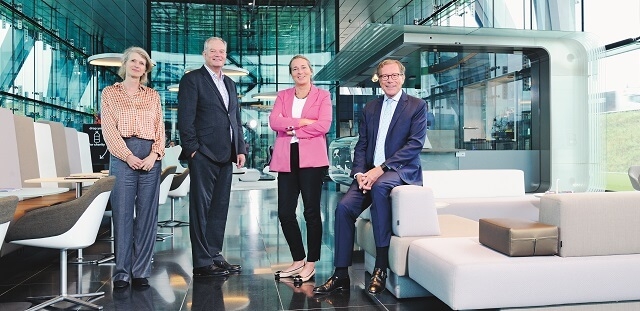Board Effectiveness in Turbulent Times: 'Are We Actually Talking About the Same Thing?'

With ample experience on various boards, Martika Jonk, Anja Montijn and Dirk Jan van den Berg know the importance of adapting to major social changes and addressing issues such as sustainability, rapidly accelerating digitization and diversity and inclusion. They are conscious of the role in society of the companies they supervise and wish to challenge directors to maintain their connection to society even in turbulent times, to create a positive impact. Victor Prozesky, founder of The Board Practice, talked to these three people about the tremendous challenges associated with board effectiveness.
Even before Covid, stakeholder governance was garnering attention. However, the pandemic has acted as a catalyst for an ‘ESG explosion.’ What are the main consequences of this attention to ESG on how boards operate?
Jonk: ‘As participants in this roundtable, we are on different Supervisory Boards, leading us to have varying perspectives and perhaps also a different understanding of events in society and the possible effects of these developments on a company. Personally, I see it as our duty to continue to pose critical questions regarding our companies’ strategy. We have seen a shift from Profit to People and now, to Planet. These are transitional times and companies will need to respond accordingly. Pakistan has been suffering from floods, while the Netherlands and elsewhere experienced severe drought. It is up to us to hold up a mirror to our companies and make sure that they do what is right. I truly believe there is no company in the Netherlands at this moment that does not have ESG on its agenda. I think it is a very important duty of Supervisory Boards to make our companies act in accordance with what is happening in society, but also to get them to prepare for the changes we see. We need to ensure the right topics end up on the agenda, whether this concerns the energy transition, developments regarding labor shortages or diversity. My own responsibility is to read widely and stay informed of current events in society.’
So, Supervisory Board members develop their own views on the broader theme of ESG. What are the pitfalls of such discussions?
Montijn: ‘Boards must be careful not to approach sustainability as an entirely separate agenda item. Your first step should be to set up a dialogue session with the Supervisory Board and Board of Directors to explore what everyone means by such concepts as sustainability and social responsibility. There will probably be a range of different answers. Your next step is to consider to what extent you are all headed the same way and share the same ambitions. What is realistic? Then you translate that into actions and embed it in your strategy. This method allows you to incorporate sustainability into normal business operations as fast as possible.’
Van den Berg: ‘While not wanting to sound overly pessimistic, I see a lot of compliance-oriented thinking so far. I think board members must be honest about this towards one another, and that a shift in attitude will be needed. One thing currently playing out in healthcare is that health is not exclusive to doctors, but an issue that basically concerns us all. Companies in this sector need to be asking ourselves to what extent their policies and values are genuinely about ‘health.’ Boards must make time to reflect on their own intrinsic motivation, as opposed to government mandates. I think it would be hugely beneficial to companies to be able to demonstrate how we serve society more clearly.’
Jonk: ‘Discussions about impact are always complex, but at their core, they all come down to one thing: how can we truly contribute to a better living environment? For example, at Heijmans we have now acquired shares in a transportation company that uses hydrogen-powered trucks. This is a concrete contribution in what has historically been a very polluting industry.’
Montijn: ‘Two years ago, it was still considered acceptable for companies to draw up sustainability strategies for the longer term; for 2030 or 2040. It is good that we are now also expected to define the steps we intend to take to get there. In my own experience, most companies will not actually do much about sustainability until their shareholders require it of them.’
Jonk: ‘NGOs taking legal action have definitely had an effect. They have forced companies such as Shell to make changes. Younger generations looking for other ways of working have done a lot to get organizations moving as well. And then of course there is the European Union, which is also forcing companies to take steps. That inspires me to optimism.’
What can boards do to make an impact when this concept is still so vaguely defined?
Van den Berg: ‘People’s interest in this issue is growing. They want to address possible ways to define impact and to report it. Or how to use impact measurement to guide decision-making. How these aspects should be designed and how to make it all work are currently lively topics of discussion. Things are happening.’
Jonk: ‘We are still working on the definitions. If we do not base ourselves on the same definitions, it all becomes pointless. We all need to be talking about the same things. Furthermore, you cannot report on a hundred different variables, so choices must be made.’
Montijn: ‘Impact relates to so many layers. That means starting with more of a strategic discussion, figuring out what we really want first. What will be our focus, what are our priorities? In which areas can we make an impact? After that, we can move on to the implementation.’
There are limits to what we can do to make an impact. Do discussions of what can and must be done ever lead to tension?
Van den Berg: ‘It is natural to us to discuss things and exchange views until we reach a consensus. I have been on some Anglo-Saxon boards which worked quite differently. There, the board was more likely to issue instructions to management. Do this, do that or there will be consequences.’
Jonk: ‘A bit of tension is normal. It is our role to be critical and get things moving in the right direction. The dialogue is ongoing. It is what makes our work interesting.’
Montijn: ‘Agreed, but this is no simple matter. As Supervisory Board members, to be able to discuss priorities, we need to know what we are talking about and have an excellent understanding of our companies’ core business.’
Jonk: ‘Supervisory Board members need to understand where things can go wrong and how to maintain control. A lower level exists as well, though. For example, it is important to have one of your board members be a tech specialist.’
Diversity is another hot topic currently. Companies are conscious of their responsibilities in this area and are making genuine progress. Diversity is closely related to inclusion, a concept which is much harder to link to concrete actions. Do you see organizations struggling with this?
Montijn: ‘Definitely. I believe that people often have a poor understanding of what inclusion truly means. Inclusion is where it all begins; it needs to be a part of your company culture. It is about assuming responsibility. It is about making sure everyone’s input is valued, not just counting how many women are on your staff.’
Jonk: ‘I see it differently. To me, it is about people feeling welcome and included at a company, regardless of the level at which they work. That they can eat halal food, or feel safe as someone who is LGBTQIA+.’
Van den Berg: ‘Inclusion means feeling that you are part of society or a certain company. There is also inclusion as a leadership style. Am I truly caring for everyone in my organization? Am I giving people opportunities and space to present entirely new ideas which may sound a bit strange at first, but that we are willing to try? Inclusion means making space for a wide range of different talents, experiences and backgrounds within your organization.’
Montijn: ‘Yes, but you can embed diversity and still not be an inclusive organization. That is the point I was making. Inclusivity needs to be part of your culture. ’
Jonk: ‘In the end, what you want is satisfied employees, which is highly relevant considering the current shortages, and to make full use of all the talent within your organization. What is inclusion’s ultimate goal? Businesses are not charitable organizations, after all. That is why I see the goal as keeping your staff happy in order to, ultimately, make your company more successful.’
What is a Supervisory Board’s role in determining company culture? And how do you ensure that your Board of Directors acts on these views?
Montijn: ‘It all starts with how you work with your Board of Directors. It is interesting to see in how many areas we can exert our influence, both directly and indirectly. That applies to the ways in which we ask questions as a Supervisory Board, but also to demonstrating how to reflect on our behavior as a team. It is about having fun, too. I was once on a board where everything was always deadly serious. How can you even do business that way? Supervisory Board members should behave in accordance with the company culture we aim to see.’
Van den Berg: ‘Supervisory Boards only meet five or six times a year. There must be a more flexible way to do things. New information crops up every day and things are changing much faster. We need to stay on top of things better. I make time to speak to the people I hold in my care regularly and have great respect for them. Even though these are generally just brief Teams meetings, they are very valuable. Meeting informally several times a year is a great way to encourage team spirit.’
Nearly all listed companies review the effectiveness of their Boards of Directors periodically. What do you consider essential to a good review?
Jonk: ‘For it to be a good review, you cannot leave anything out. Is everyone given a chance to have their say, is the chair involved enough and is the relationship with the directors built on trust?’
Van den Berg: ‘It is definitely important for such reviews to be carried out by someone from outside the company and for the board members to be challenged to answer difficult questions. This can make for a time-intensive process, and moreover, one that should happen at least every two years. Also, to do things properly, you really need an experienced expert, and the stakeholders need to be involved.’
This article was published in Management Scope 08 2022.
This article was last changed on 28-09-2022

